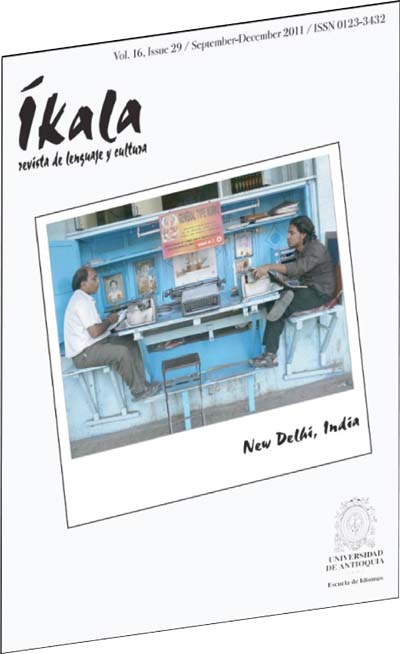A censura e o silêncio vistos à luz da Teoria da Cortesia: análise pragmalinguistica de Diatriba de amor contra un hombre sentado de Gabriel García Márquez
DOI:
https://doi.org/10.17533/udea.ikala.5136Palavras-chave:
Teoria da cortesia, análise conversacional, silêncio, censura, Diatriba de amor contra un hombre sentado de Gabriel García MárquezResumo
Este artigo apresenta alguns resultados da análise pragmalinguistica de Diatriba de amor contra un hombre sentado de Gabriel García Márquez, especificamente os que tangem aos modelos da teoria da cortesia e à análise conversacional. A análise centra-se na censura e no silêncio, esgrimidos respectivamente por Graciela e o marido (protagonistas do drama) como único recurso interacional. Selecionaram-se duas emissões compostas por esses atos comunicativos; para a censura estabeleceu-se o nível de ameaça à imagem, diferenciando quando aponta para a imagem positiva e para a imagem negativa; para o silêncio estabeleceu-se a negativa a cumprir com os lugares pertinentes à transição (LPT) e os movimentos. Dentro das conclusões encontramos a censura como um ato de fala que atenta simultaneamente contra as duas imagens; por outro lado, caracteriza-se comunicativamente o silêncio do marido, identificando seu significado, embora careça de conteúdo proposicional.
Downloads
Referências
Brown, R & Gilman, A. (1989). Politeness theory and Shakespeare's four major tragedies. Language and Society, 18, 159-212.
Brown, P. & Levinson, S. (1987). Politeness. Some Universals in Language Usage. Cambridge: Cambridge University Press.
Ephratt, M. (2008). The functions of silence. Journal of Pragmatics, 40, 1909-1938.
Gallardo, B. (1996). Análisis conversacional y pragmática del receptor. Valencia: Episteme.
García Márquez, G. (1994). Diatriba de amor contra un hombre sentado. Monólogo en un acto. Bogotá: Arango editores.
Haverkate, H. (2002). Los diálogos de Don Quijote de la Mancha: análisis pragmalingüís-tico en el marco de las máximas griceanas, la teoría de los actos de habla y la teoría de la cortesía. Lingüística y Literatura, 23(41/42), 11-38.
Levinson, S. (1983). Pragmatics. Cambridge: Cambridge University Press.
Mateu Serra, R. (2001). El lugar del silencio en el proceso de la comunicación. (Tesis doctoral no publicada). Universidad de Lleida, Departamento de Filología Clásica, Francesa e Hispánica, Lérida.
Owen, M. (1981). Conversational units and the use of 'well...'. En Werth, P. (Ed.), Conversation and Discourse (pp. 99-116). New York: St Martin's Press.
Poyatos, F. (1994). La comunicación no verbal. Vol. I: Cultura lenguaje y conversación. Madrid: Istmo.
Real Academia Española –RAE–. (2001). Diccionario de la Lengua Española (22.a ed.). Recuperado de http://rae.es/rae.html
Sacks, H., Schegloff, E. A. & Jefferson, G. (1978). A simplest systematics for the organization of turn taking for conversation. En Schenkein, J. (Ed.), Studies in the organization of the conversational interaction (pp. 1-55). New York: Academic.
Sobkowiak, W. (1997). Silence and markedness theory. En Jaworski, A. (Ed.), Silence. Interdisciplinary perspectives (pp. 36-61). Berlin-New York: Mouton de Gruyter.
Tusón, A. (1997). Análisis de la conversación. Barcelona: Ariel.
Vallejo, V. (2009). Entre el reproche y el silencio: análisis de 'Diatriba de amor contra un hombre sentado de Gabriel García Márquez'. (Trabajo de grado de maestría no publicado). Facultad de Comunicaciones, Universidad de Antioquia, Medellín.
Downloads
Publicado
Como Citar
Edição
Seção
Licença
Copyright (c) 2011 Íkala, Revista de Lenguaje y Cultura

Este trabalho está licenciado sob uma licença Creative Commons Attribution-NonCommercial-ShareAlike 4.0 International License.












